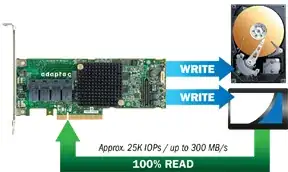Note that in addition to Adaptec's "Hybrid RAID", they also have something they call "Max Cache".
Hybrid RAID allows you to have your SSDs backed by regular spinning discs, to decrease the cost of the RAID array. The downside is that if you need the performance of the SSDs, you probably can't survive running on the mechanical disc. So you're getting the write performance of a spinning disc, and will probably have to take services down until the array rebuild completes -- seems pretty limited in usefulness to me. I'm speculating that you'd be better off with a 5 drive all SSD RAID-5 array than a 8 drive hybrid, but I don't have any numbers to back that up.
Max Cache allows you to put in an SSD as a cache device for your array of spinning discs. This sounds promising, but the fine print is that this cache is write-through only, so your writes happen at the speed of the spinning discs, and only reads are accelerated. If you need read acceleration, that's probably a pretty good way to go, but I haven't personally tested it.
If you are running 64-bit Linux, you can try the flashcache kernel module which allows you to do either write-through or write-back (though there may be data safety issues with write-back) caching of one block device to another. I've played with this and it works well, but in the situation I was planning to put it into production recently the system was 32-bit and it really does not work in 32-bit currently (July 2011).
